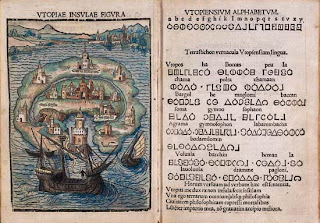|

|
|
Dans le langage courant actuel, " utopique " veut dire
impossible ; une utopie est une chimère, une construction purement imaginaire dont la
réalisation est, a priori, hors de notre portée. Or, paradoxalement, les auteurs qui ont
créé le mot, puis illustré le genre littéraire inventé par Thomas More en 1516,
avaient plutôt pour ambition d'élargir le champ du possible, et d'abord de l'explorer.
Certes, l'utopie se caractérise par un recours à la fiction, par un artifice littéraire
qui consiste à décrire une société idéale dans une géographie imaginaire, souvent
dans le cadre d'un récit de voyage purement romanesque. Mais imaginaire ou fictif ne veut
pas dire impossible : tout rêve n'est pas chimère

In the current, " utopia " ordinary language means impossible; a utopia is a fancy, a purely imaginary construction the realization of which is, a priori, outside our reach. Now, paradoxically, the authors who created the word, then illustrated the literary genre invented by Thomas More in 1516, had rather for ambition to widen the field of the possible, and at first to investigate it. Certainly, the utopia is characterized by an appeal to the fiction, by a literary subtlety which consists in describing an ideal society in an imaginary geography, often within the framework of a purely romantic travel story. But imaginary or fictitious does not mean impossible: any dream is not fancy
de très belles fêtes à vous !!!
very beautiful holidays to you!!!
Myriam et Gilles | | | | | | | | | | |
|
Aucun commentaire:
Enregistrer un commentaire